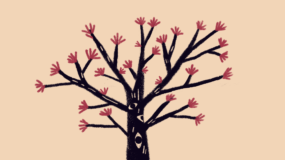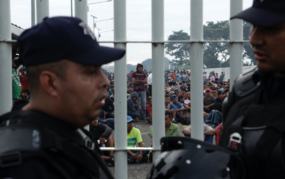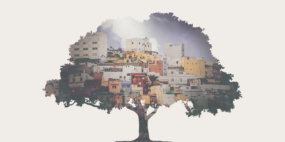Vienna, 10 February 2023
The Global Initiative Against Transnational Organized Crime (GI-TOC) is pleased to announce the selection of 10 successful applicants for the 2023 Resilience Fellowship, the theme of which is human rights and organized crime. The annual Fellowship builds a platform for cross-sectoral, global and interdisciplinary collaboration between civil society actors, human rights activists, journalists, artists, scholars, policymakers, grassroots community leaders and others working to counter the effects of organized crime.
The 2023 Fellows are diverse in background, geography and approaches, coming variously from Latin America, the Caribbean, francophone Africa, East Africa, Western and South East Asia. The group includes journalists, artists, community advocates and LGBTQ+ activists.
Every day all over the world, people’s right to life and liberty are violently shattered by the powerful combination of criminal organizations and corrupt states. Organized crime enslaves and tortures people everywhere … silencing the press, disappearing people and targeting minorities with impunity. Human rights defenders are paying with their lives. We cannot let them stand alone. We urgently need networks to support them, and we aim to do so through the 2023 Fellowship.
– Siria Gastélum Félix, Resilience Fund director
Meet the 2023 Resilience Fellows
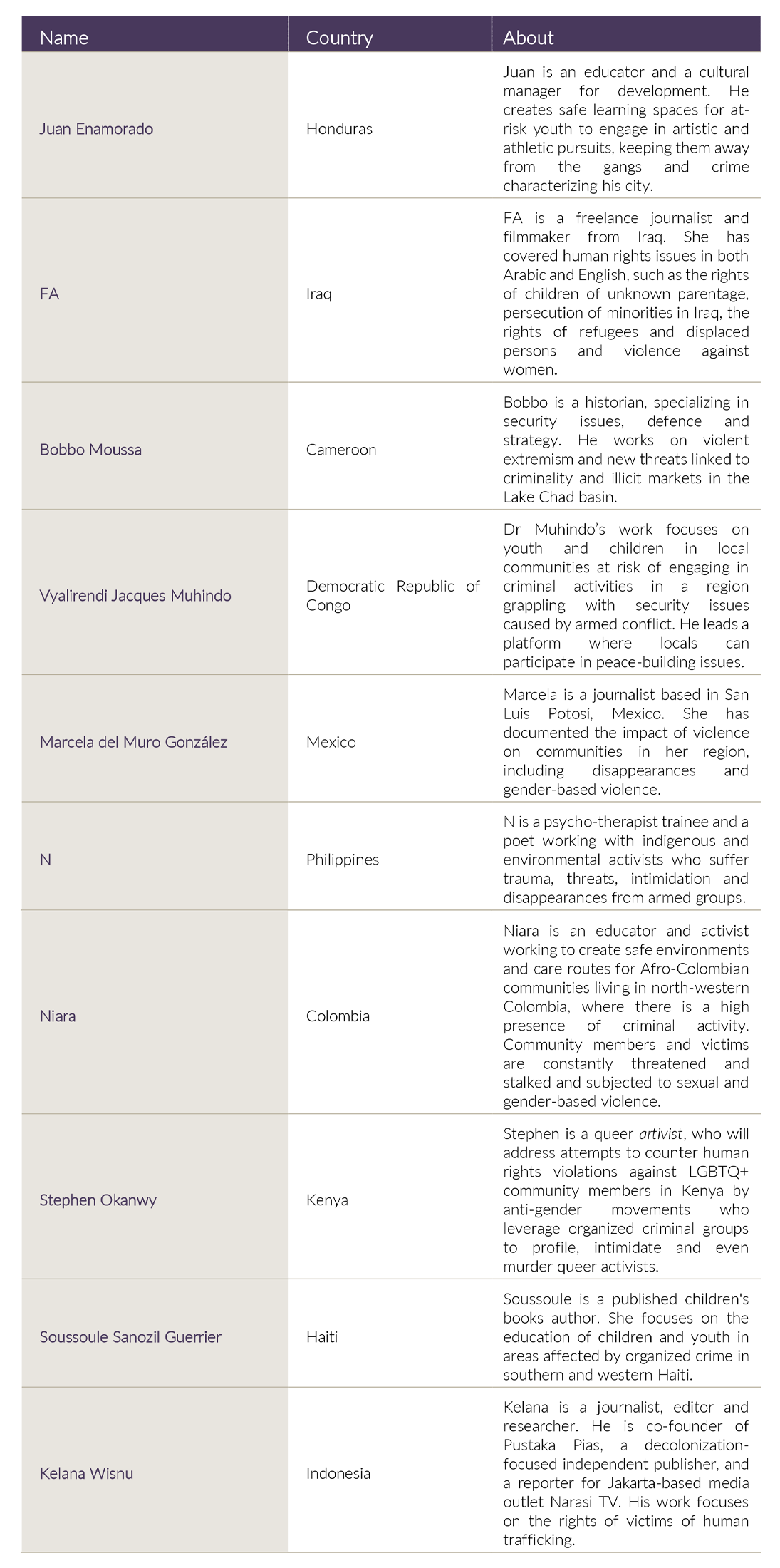
About the Resilience Fellowship
The Fellowship is part of the GI-TOC’s flagship Resilience Fund, a grant mechanism funded by the governments of Norway, New Zealand, the Netherlands and Germany, which provides support to civil society and communities working to counter the effects of criminal governance and violence across the world (more information here).
The theme for the Fellowship’s first edition, in 2020, was disappearances, which resulted in a final collaborative project: A place called disappeared: The landscapes and stories of those who are #StillMissing. In 2021, the theme was extortion. Aside from their projects and workshops, the Fellows collaborated on a statement against extortion and produced a video to amplify their message: End extortion now. Last year’s Fellowship took the theme of environmental crime, focusing on areas such as illegal logging; illegal, unreported and unregulated fishing; and the environmental effects on indigenous protected areas.
The Resilience Fellowship is based on a three-pronged approach:
- Sponsorship: Providing financial support so that Fellows will have the time and resources for their individual work and a collaborative project during the Fellowship year. Grants of US$15 000 per Fellow are awarded for one year.
- Networking: Offering mentorship opportunities with experts from the GI-TOC, as well as bringing Fellows together to begin a collaborative project to be undertaken during their Fellowship year.
- Dissemination: Creating a platform for Fellows to publicly share their work and ideas, via conferences, civil society forums and national and international publications. This is intended to widen public discourse, deepen engagement with society and invite the support and participation of the general public and, ultimately, policymakers.
The Resilience Fellowship is not designed to be a standalone grant application procedure to develop individual projects, but a support mechanism for collaborative processes with other committed individuals who are already developing creative perspectives on community resilience and organized crime through dialogue, commitment and action. Thus, the Fund gives preference to those applicants with the incentives and means to collaborate on sustainable projects.
About the Fellowship theme for 2023: Human rights and organized crime
The theme for 2023 was selected because the presence of organized crime in any form leads to violations of a range of human rights, from the right to life, liberty, security of person and property to freedom of movement and freedom of speech. As criminal forces continue to expand their activities and control, communities the world over suffer immense harms to their people, lands and livelihoods.
Examples of projects that we seek to develop include:
- Rights of youth and children threatened by forced labour, modern slavery or human trafficking.
- Rights of youth and children threatened by the activities of criminal groups, including recruitment by gangs, or their involvement in criminal activity such as extortion, micro-trafficking or murder-for-hire.
- Women’s rights as violated by manifestations of criminal governance and exploitation, including sexual exploitation, human smuggling and trafficking, and forced labour in the mining, manufacturing or agricultural sectors.
- Indigenous rights endangered by the presence of criminal markets, including land grabbing, illegal logging, illegal mining or illegal crop plantations in protected territories.
- Gender rights, including the harassment of or systematic attacks on LGBTQ+ communities by criminal actors.
- Migrants’ rights jeopardized by criminal organizations controlling routes or mobility.
- Protection of freedom of speech, especially regarding independent media houses and journalists, from harassment or attacks by criminal actors.
- Protection of digital rights, including instances in which organized criminal groups exploit vulnerable communities through digital threats, or where anti-cybercrime legislation is used by authorities to crack down on protests, freedom of speech or information sharing.
About the Resilience Fund
With the support of the government of Norway, in March 2019, the GI-TOC launched the Civil Society Resilience Fund Against Organized Crime, which aims to counter the impact of organized crime worldwide by supporting efforts of civil society and non-state actors in developing resilience in their communities (more information here).
About the Global Initiative Against Transnational Organized Crime
The GI-TOC is a non-profit international organization comprising a network of over 600 independent global and regional experts. The GI-TOC seeks to open new lines of analysis to provide creative solutions to the challenges of organized crime, and to serve as an exchange and collaboration platform among governments, civil society, scholars, the private sector and other actors. Founded in 2013 and headquartered in Geneva, the GI-TOC has representation on every continent (more information here).
Join the Resilience Fund mailing list to get regular updates from our team and the beneficiaries.
El Fondo Resiliencia de GI-TOC selecciona a 10 Fellows para trabajar proyectos de derechos humanos y crimen organizado
Viena, 10 de febrero del 2023
The Global Initiative Against Transnational Organized Crime (La Iniciativa global contra el crimen organizado transnacional, GI-TOC) se complace en anunciar los 10 candidatos seleccionados para el Fellowship en Resiliencia 2023, cuya temática es los derechos humanos y el crimen organizado. El Fellowship anual busca construir una plataforma de colaboración intersectorial, global e interdisciplinaria entre actores de la sociedad civil, activistas de derechos humanos, periodistas, artistas, académicos, responsables políticos, líderes comunitarios y otros actores que trabajan para combatir los efectos del crimen organizado.
El grupo de Fellows del 2023 es diverso en cuanto a antecedentes, geografía y enfoques, e incluye a personas de Latinoamérica, el Caribe, países africanos francófonos, África Oriental, y Asia Occidental y Sudoriental. El grupo incluye periodistas, artistas, organizadores comunitarios y activistas LGBTQ+.
Todos los días y en todo el mundo, el derecho a la vida y a la libertad de las personas se ve violentamente destrozado por la poderosa combinación de organizaciones delictivas y Estados corruptos. El crimen organizado esclaviza y tortura a personas en todas partes… silenciando a la prensa, haciendo desaparecer a personas y atacando impunemente a las minorías. Los defensores de los derechos humanos están pagando con su vida. No podemos dejarles solos. Necesitamos urgentemente redes que los apoyen y nuestro objetivo es hacerlo a través del Fellowship 2023.
– Siria Gastélum Félix, directora del Fondo Resiliencia
Conoce a los Fellows 2023
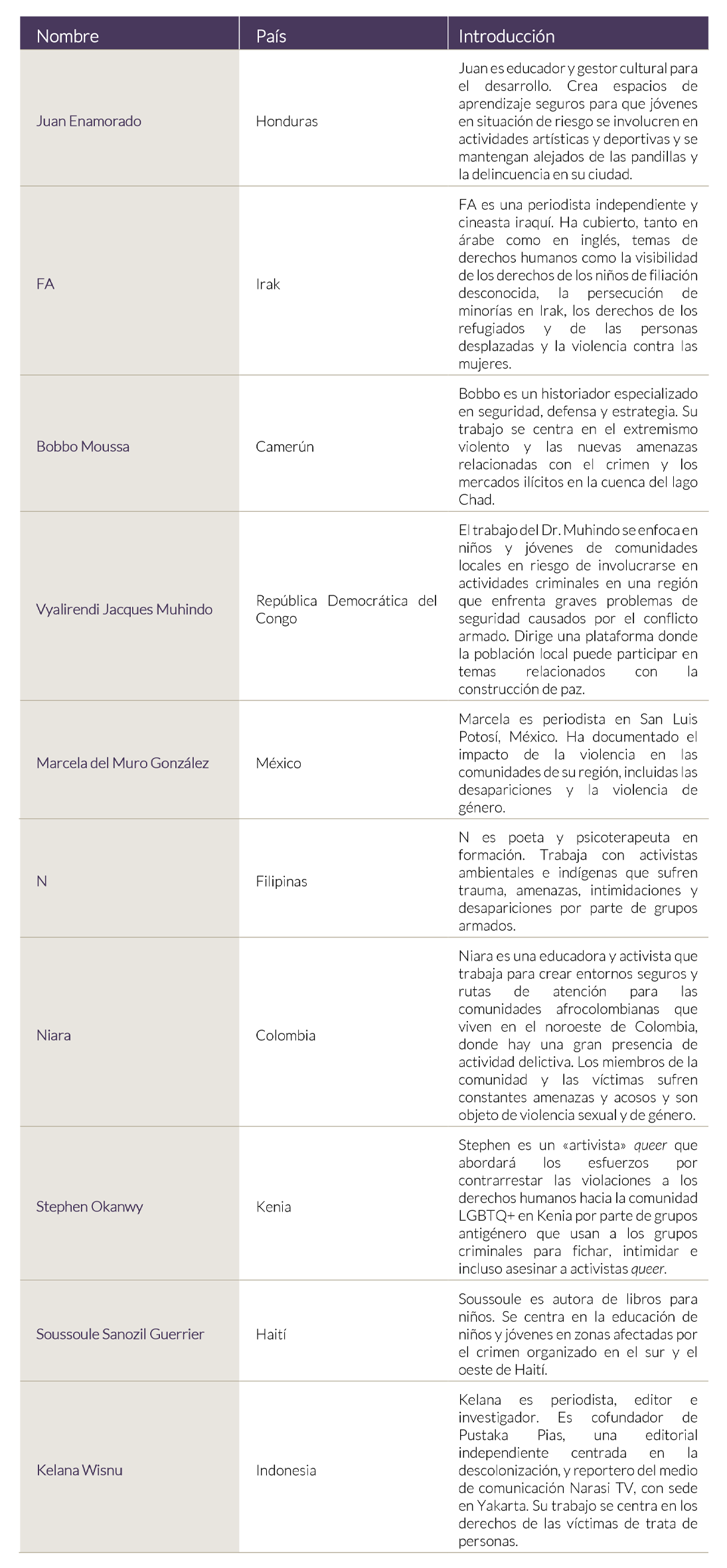
Sobre el Fellowship en Resiliencia
El Fellowship es parte del Fondo Resiliencia creado por GI-TOC, un mecanismo fundado con apoyo de los gobiernos de Noruega, Nueva Zelanda, los Países Bajos y Alemania, que brinda apoyo a organizaciones de la sociedad civil y comunidades que trabajan para combatir los efectos de la gobernanza criminal y la violencia en todo el mundo (más información aquí).
La primera edición del Fellowship en Resiliencia en 2020 tuvo como temática las desapariciones relacionadas con el crimen organizado. El resultado fue el proyecto colaborativo: Desaparecido es un lugar: Lugares e historias de quienes #TodaviaFaltan. En 2021 la temática seleccionada fue la extorsión. Además de trabajar en sus proyectos y talleres, los Fellows colaboraron en una declaración contra la extorsión y produjeron un video para dar mayor alcance a su mensaje: Acabar con la extorsión. ¡Ahora! El año pasado, el Fellowship tuvo como temática el crimen ambiental, centrándose en áreas como la tala ilegal; la pesca ilegal, no declarada y no reglamentada; y los impactos ambientales en las áreas indígenas protegidas.
El Fellowship en Resiliencia se basa en un enfoque triple:
- Subvención: Proporcionar apoyo financiero para que los Fellows dispongan de tiempo y recursos para su trabajo individual y para un proyecto de colaboración durante el año del Fellowship. Se otorgarán subvenciones de 15 000 dólares por Fellow durante un año.
- Creación de redes: Ofrecer oportunidades de mentoría con expertos de GI-TOC, así como reunir a los Fellows para iniciar un proyecto colaborativo que se llevará a cabo durante su año en el Fellowship.
- Difusión: Crear una plataforma para que los Fellows compartan públicamente su trabajo y sus ideas (mediante espacios como conferencias, foros de la sociedad civil y publicaciones nacionales e internacionales), que ampliará el discurso público, profundizará el compromiso con la sociedad y promoverá el apoyo y la participación del público en general y, en última instancia, de los responsables políticos.
El Fellowship en Resiliencia no está diseñado como un procedimiento de convocatorias para candidaturas independientes que buscan desarrollar proyectos individuales, sino como un mecanismo de apoyo a iniciativas colaborativas con personas comprometidas que ya están desarrollando perspectivas creativas en torno a la resiliencia comunitaria y al crimen organizado a través del diálogo, el compromiso y la acción. De esta manera, el Fondo dará preferencia a aquellos candidatos que tengan los incentivos y los medios para colaborar en proyectos sostenibles.
Sobre la temática del Fellowship para el 2023: Derechos humanos y crimen organizado
El tema del 2023 fue seleccionado debido a que la presencia del crimen organizado, en cualquiera de sus formas, conduce a la violación de un amplio rango de derechos humanos, desde el derecho a la vida, a la libertad, a la seguridad de la persona y de la propiedad, hasta el derecho a la libre circulación y a la libre expresión. A medida que las fuerzas criminales amplían sus actividades y su control, comunidades en todo el mundo sufren inmensos daños en su población, sus tierras y sus medios de vida.
Ejemplos de proyectos que buscamos desarrollar incluyen:
- Los derechos de los jóvenes y los niños amenazados por el trabajo forzado, la esclavitud moderna o la trata de personas.
- Los derechos de los jóvenes y los niños amenazados por las actividades de los grupos criminales, incluido el reclutamiento por parte de pandillas o su participación en actividades criminales como la extorsión, el microtráfico o el sicariato.
- Los derechos de las mujeres violados por las manifestaciones de la gobernanza criminal y la explotación, incluida la explotación sexual, el tráfico y el contrabando de seres humanos, y el trabajo forzado en los sectores minero, manufacturero o agrícola.
- Los derechos indígenas amenazados por la presencia de mercados criminales, incluyendo el robo de tierras, la tala ilegal, la minería ilegal o las plantaciones de cultivos ilícitos en territorios protegidos.
- Los derechos de género, incluyendo el acoso o los ataques sistemáticos a comunidades LGTBQ+ por parte de actores criminales.
- Los derechos de los migrantes amenazados por las organizaciones criminales que controlan las rutas o la movilidad.
- Protección de la libre expresión, especialmente en lo que respecta a los medios de comunicación independientes y a los periodistas, frente al acoso o los ataques de actores criminales.
- Protección de los derechos digitales, incluyendo cuando grupos criminales organizados explotan a comunidades vulnerables mediante amenazas digitales, o cuando las autoridades utilizan la legislación contra la ciberdelincuencia para reprimir las protestas, la libre expresión o el intercambio de información.
Sobre el Fondo Resiliencia
Con el apoyo del Gobierno de Noruega, en marzo de 2019, GI-TOC estableció el Fondo Resiliencia de la Sociedad Civil contra el Crimen Organizado, cuyo objetivo es contrarrestar los efectos del crimen organizado a escala mundial apoyando a la sociedad civil y a los actores no estatales en el fortalecimiento de la resiliencia en sus comunidades (más información aquí).
Sobre The Global Initiative Against Transnational Organized Crime
GI-TOC es una organización internacional sin fines de lucro compuesta por una red de más de 600 expertos independientes en el ámbito regional e internacional. GI-TOC busca proponer nuevas líneas de análisis para ofrecer soluciones creativas a los retos del crimen organizado, y servir como plataforma de colaboración e intercambio entre Gobiernos, miembros de la sociedad civil, académicos, miembros del sector privado y otros actores. Fundada en el 2013 y con sede en Ginebra, GI-TOC tiene representación en cada continente (más información aquí).
Te invitamos a registrarte en la lista de contactos del Fondo Resiliencia para recibir actualizaciones periódicas sobre nuestros beneficiarios y mantenerte en comunicación con nosotros.
Le Fonds pour la résilience de la GI-TOC sélectionne 10 lauréats pour défendre les droits humains face au crime organisé
Vienne, le 10 février 2023
La Global Initiative Against Transnational Organized Crime (L’Initiative mondiale contre le crime organisé transnational, GI-TOC) a le plaisir d’annoncer les 10 lauréats de la Bourse pour la résilience 2023, dont le thème est les droits humains et le crime organisé. Cette Bourse annuelle constitue une plateforme de collaboration intersectorielle, mondiale et interdisciplinaire entre des acteurs de la société civile, des défenseurs des droits de l’homme, des journalistes, des artistes, des universitaires, des décideurs politiques, des responsables communautaires locaux et d’autres acteurs qui luttent contre les effets du crime organisé.
Le groupe des boursiers et boursières 2023 est divers en termes de parcours, de géographie et d’approches, et comprend des ressortissants d’Amérique latine, de pays africains francophones, d’Afrique de l’Est et d’Asie du Sud-Est. Parmi eux, des journalistes, des artistes, des défenseurs de la communauté et des militants LGBTQ+.
Chaque jour dans le monde entier, le droit des personnes à la vie et à la liberté est brisé violemment par la puissante combinaison d’organisations criminelles et d’États corrompus. Partout, le crime organisé asservit et torture les gens… il réduit la presse au silence, fait disparaître des personnes et s’en prend aux minorités en toute impunité. Les défenseurs des droits humains le paient de leur vie. Nous ne pouvons pas les laisser à leur sort. Il est urgent de les soutenir par le biais de réseaux, et c’est ce que nous voulons faire grâce à la bourse 2023.
– Siria Gastélum Félix, Resilience Fund director
Voici les boursiers et boursières pour 2023
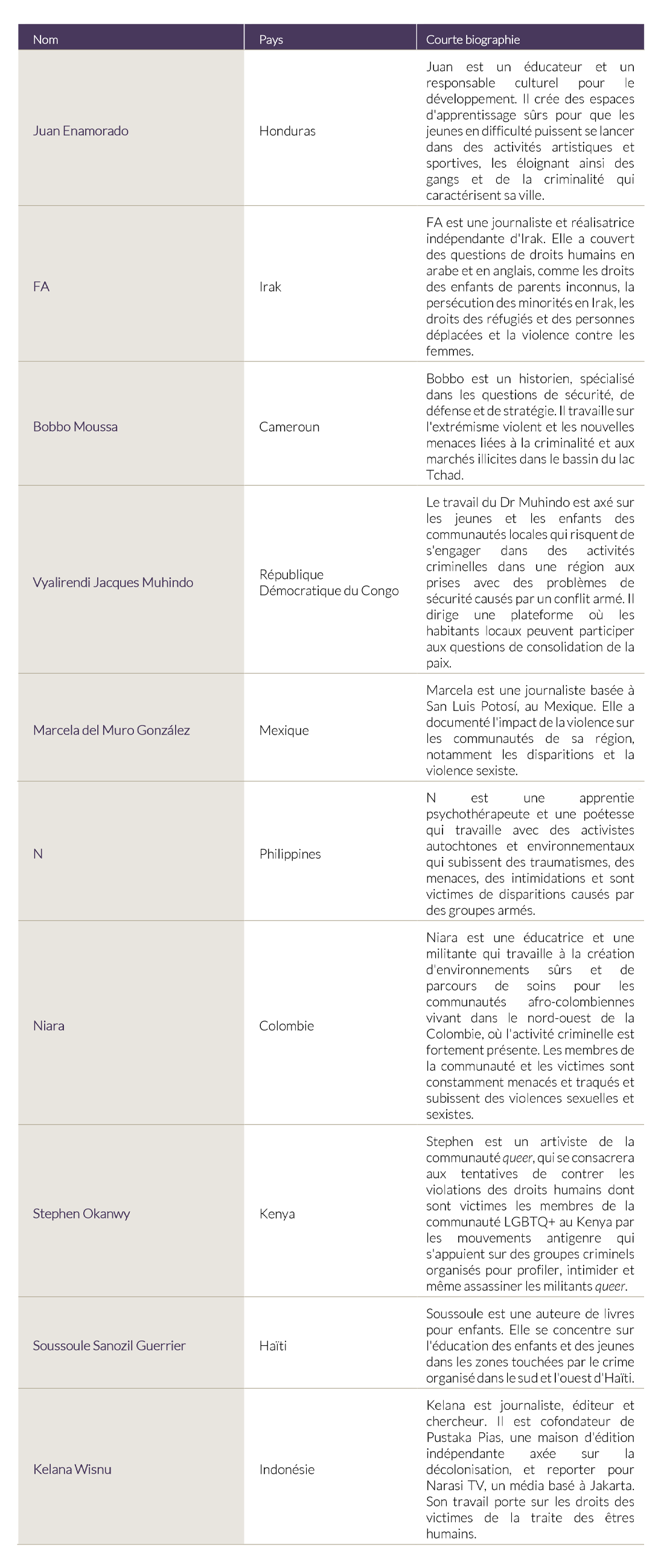
À propos de la Bourse de résilience
La bourse fait partie du Fonds pour la résilience, programme phare de la GI-TOC, un mécanisme de subvention financé par les gouvernements de Norvège, de Nouvelle-Zélande, des Pays-Bas et d’Allemagne, qui apporte un soutien à la société civile et aux communautés qui s’efforcent de contrer les effets de la gouvernance criminelle et de la violence dans le monde entier (plus d’informations ici).
Le thème de la première édition de la Bourse, en 2020, était les disparitions, ce qui a donné lieu à un projet collaboratif final : A place called disappeared: The landscapes and stories of those who are #StillMissing (« Un lieu appelé disparu : Les paysages et les histoires de ceux qui restent introuvables »). En 2021, le thème était l’extorsion. En plus de leurs projets et ateliers, les boursiers ont collaboré à une déclaration contre l’extorsion et ont produit une vidéo pour amplifier leur message : End extortion now. (« Finissons-en avec l’extorsion maintenant). La Bourse de l’année dernière abordait le thème de la criminalité environnementale, en se concentrant sur des domaines tels que l’exploitation forestière illégale ; la pêche illégale, non déclarée et non réglementée ; et les effets environnementaux sur les zones autochtones protégées.
La Bourse pour la résilience est basée sur une approche à trois volets :
- Parrainage : offrir un soutien financier aux boursiers afin qu’ils disposent du temps et des ressources nécessaires pour réaliser un travail individuel et un projet collaboratif pendant l’année de la bourse. Un montant de 15 000 dollars US par boursier sera accordé pour un an.
- Mise en réseau : proposer la mise en place de tutorat avec des experts de la GI-TOC et réunir les boursiers pour démarrer un projet collaboratif à produire pendant leur année de bourse.
- Diffusion : créer une plateforme permettant aux boursiers de partager publiquement leurs travaux et leurs idées (à travers des conférences, des forums de la société civile, des publications nationales et internationales, etc.). Ceci permettra d’élargir le débat public, d’approfondir les relations avec la société, de solliciter le soutien et la participation du grand public et, enfin, des décideurs politiques.
La Bourse pour la résilience n’est pas conçue pour être une procédure de demande de subvention autonome afin de développer des projets individuels. C’est un mécanisme de soutien aux processus collaboratifs entre personnes engagées qui développent déjà des approches créatives sur la résilience des communautés et le crime organisé par le dialogue, l’engagement et l’action. Ainsi, le Fonds privilégiera les candidats et candidates faisant preuve d’une réelle motivation et des moyens nécessaires pour collaborer sur des projets durables.
À propos du thème de la Bourse pour 2023: Droits humains et crime organisé
Le thème de 2023 a été choisi car la présence du crime organisé, sous quelque forme que ce soit, entraîne des violations de toute une série de droits humains, du droit à la vie, à la liberté, à la sécurité des personnes et des biens à la liberté de mouvement et à la liberté d’expression. Alors que les forces criminelles continuent d’étendre leurs activités et leur contrôle, les communautés du monde entier subissent d’immenses préjudices pour leurs peuples, leurs terres et leurs moyens de subsistance.
Voici quelques exemples de projets que nous cherchons à développer :
- droits des jeunes et des enfants menacés par le travail forcé, l’esclavage moderne ou la traite des êtres humains ;
- droits des jeunes et des enfants menacés par les activités de groupes criminels, notamment le recrutement par des gangs, ou leur implication dans des activités criminelles telles que l’extorsion, le micro-trafic ou le meurtre à gages ;
- droits des femmes bafoués par les manifestations de gouvernance et d’exploitation criminelles, notamment l’exploitation sexuelle, le trafic et la traite des êtres humains, ou encore le travail forcé dans les secteurs minier, manufacturier ou agricole ;
- les droits des peuples autochtones mis en danger par la présence de marchés criminels, notamment l’accaparement de terres, l’exploitation forestière illégale, l’exploitation minière illégale ou les plantations de cultures illégales dans les territoires protégés ;
- les droits des femmes, notamment le harcèlement ou les attaques systématiques des communautés LGBTQ+ par des acteurs criminels ;
- atteintes aux droits des migrants par des organisations criminelles contrôlant les itinéraires ou la mobilité ;
- protection de la liberté d’expression, notamment en ce qui concerne les maisons de presse et les journalistes indépendants, contre le harcèlement ou les attaques d’acteurs criminels ;
- protection des droits numériques, y compris lorsque des groupes criminels organisés exploitent des communautés vulnérables par le biais de menaces numériques, ou lorsque la législation anti-cybercriminalité est utilisée par les autorités pour réprimer les protestations, la liberté d’expression ou le partage d’informations.
À propos du Fonds pour la résilience
Grâce au soutien du gouvernement norvégien, en mars 2019, la GI-TOC a lancé le Fonds pour la résilience de la société civile contre le crime organisé, qui vise à contrer l’impact du crime organisé dans le monde entier en soutenant les efforts de la société civile et des acteurs non étatiques pour développer la résilience dans leurs communautés (plus d’informations ici).
À propos de la Global Initiative Against Transnational Organized Crime
La GI-TOC est une organisation internationale à but non lucratif composée d’un réseau de plus de 600 experts mondiaux et régionaux indépendants. La GI-TOC cherche à ouvrir de nouvelles voies d’analyse pour apporter des solutions novatrices aux défis du crime organisé, et à servir de plateforme d’échange et de collaboration entre les gouvernements, la société civile, les universitaires, le secteur privé et d’autres acteurs. Fondée en 2013 et basée à Genève, la GI-TOC est représentée sur tous les continents (plus d’informations ici).
Rejoignez la liste de diffusion du Fonds pour la résilience pour recevoir des mises à jour régulières de notre équipe et des bénéficiaires.



